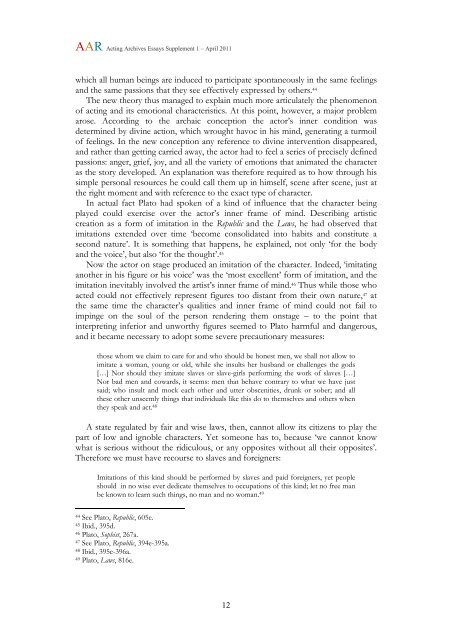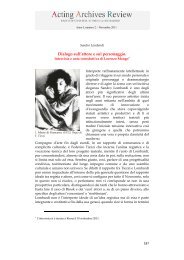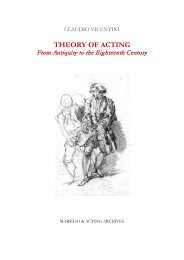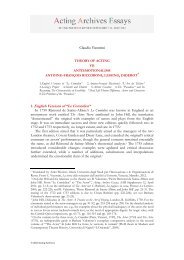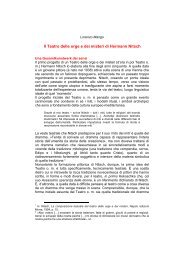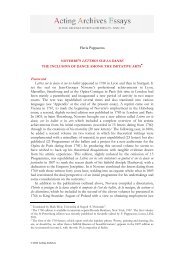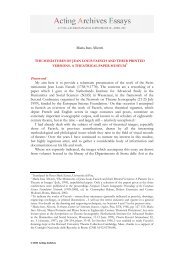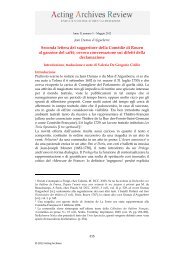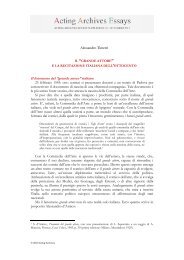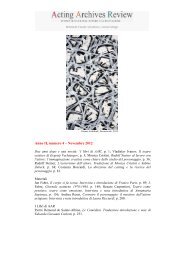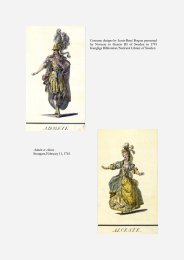Claudio Vicentini_Acting Theory in the Ancient World - Acting Archives
Claudio Vicentini_Acting Theory in the Ancient World - Acting Archives
Claudio Vicentini_Acting Theory in the Ancient World - Acting Archives
You also want an ePaper? Increase the reach of your titles
YUMPU automatically turns print PDFs into web optimized ePapers that Google loves.
AAR <strong>Act<strong>in</strong>g</strong> <strong>Archives</strong> Essays Supplement 1 – April 2011which all human be<strong>in</strong>gs are <strong>in</strong>duced to participate spontaneously <strong>in</strong> <strong>the</strong> same feel<strong>in</strong>gsand <strong>the</strong> same passions that <strong>the</strong>y see effectively expressed by o<strong>the</strong>rs. 44The new <strong>the</strong>ory thus managed to expla<strong>in</strong> much more articulately <strong>the</strong> phenomenonof act<strong>in</strong>g and its emotional characteristics. At this po<strong>in</strong>t, however, a major problemarose. Accord<strong>in</strong>g to <strong>the</strong> archaic conception <strong>the</strong> actor’s <strong>in</strong>ner condition wasdeterm<strong>in</strong>ed by div<strong>in</strong>e action, which wrought havoc <strong>in</strong> his m<strong>in</strong>d, generat<strong>in</strong>g a turmoilof feel<strong>in</strong>gs. In <strong>the</strong> new conception any reference to div<strong>in</strong>e <strong>in</strong>tervention disappeared,and ra<strong>the</strong>r than gett<strong>in</strong>g carried away, <strong>the</strong> actor had to feel a series of precisely def<strong>in</strong>edpassions: anger, grief, joy, and all <strong>the</strong> variety of emotions that animated <strong>the</strong> characteras <strong>the</strong> story developed. An explanation was <strong>the</strong>refore required as to how through hissimple personal resources he could call <strong>the</strong>m up <strong>in</strong> himself, scene after scene, just at<strong>the</strong> right moment and with reference to <strong>the</strong> exact type of character.In actual fact Plato had spoken of a k<strong>in</strong>d of <strong>in</strong>fluence that <strong>the</strong> character be<strong>in</strong>gplayed could exercise over <strong>the</strong> actor’s <strong>in</strong>ner frame of m<strong>in</strong>d. Describ<strong>in</strong>g artisticcreation as a form of imitation <strong>in</strong> <strong>the</strong> Republic and <strong>the</strong> Laws, he had observed thatimitations extended over time ‘become consolidated <strong>in</strong>to habits and constitute asecond nature’. It is someth<strong>in</strong>g that happens, he expla<strong>in</strong>ed, not only ‘for <strong>the</strong> bodyand <strong>the</strong> voice’, but also ‘for <strong>the</strong> thought’. 45Now <strong>the</strong> actor on stage produced an imitation of <strong>the</strong> character. Indeed, ‘imitat<strong>in</strong>gano<strong>the</strong>r <strong>in</strong> his figure or his voice’ was <strong>the</strong> ‘most excellent’ form of imitation, and <strong>the</strong>imitation <strong>in</strong>evitably <strong>in</strong>volved <strong>the</strong> artist’s <strong>in</strong>ner frame of m<strong>in</strong>d. 46 Thus while those whoacted could not effectively represent figures too distant from <strong>the</strong>ir own nature, 47 at<strong>the</strong> same time <strong>the</strong> character’s qualities and <strong>in</strong>ner frame of m<strong>in</strong>d could not fail toimp<strong>in</strong>ge on <strong>the</strong> soul of <strong>the</strong> person render<strong>in</strong>g <strong>the</strong>m onstage – to <strong>the</strong> po<strong>in</strong>t that<strong>in</strong>terpret<strong>in</strong>g <strong>in</strong>ferior and unworthy figures seemed to Plato harmful and dangerous,and it became necessary to adopt some severe precautionary measures:those whom we claim to care for and who should be honest men, we shall not allow toimitate a woman, young or old, while she <strong>in</strong>sults her husband or challenges <strong>the</strong> gods[…] Nor should <strong>the</strong>y imitate slaves or slave-girls perform<strong>in</strong>g <strong>the</strong> work of slaves […]Nor bad men and cowards, it seems: men that behave contrary to what we have justsaid; who <strong>in</strong>sult and mock each o<strong>the</strong>r and utter obscenities, drunk or sober; and all<strong>the</strong>se o<strong>the</strong>r unseemly th<strong>in</strong>gs that <strong>in</strong>dividuals like this do to <strong>the</strong>mselves and o<strong>the</strong>rs when<strong>the</strong>y speak and act. 48A state regulated by fair and wise laws, <strong>the</strong>n, cannot allow its citizens to play <strong>the</strong>part of low and ignoble characters. Yet someone has to, because ‘we cannot knowwhat is serious without <strong>the</strong> ridiculous, or any opposites without all <strong>the</strong>ir opposites’.Therefore we must have recourse to slaves and foreigners:Imitations of this k<strong>in</strong>d should be performed by slaves and paid foreigners, yet peopleshould <strong>in</strong> no wise ever dedicate <strong>the</strong>mselves to occupations of this k<strong>in</strong>d; let no free manbe known to learn such th<strong>in</strong>gs, no man and no woman. 4944 See Plato, Republic, 605e.45 Ibid., 395d.46 Plato, Sophist, 267a.47 See Plato, Republic, 394e-395a.48 Ibid., 395e-396a.49 Plato, Laws, 816e.12


